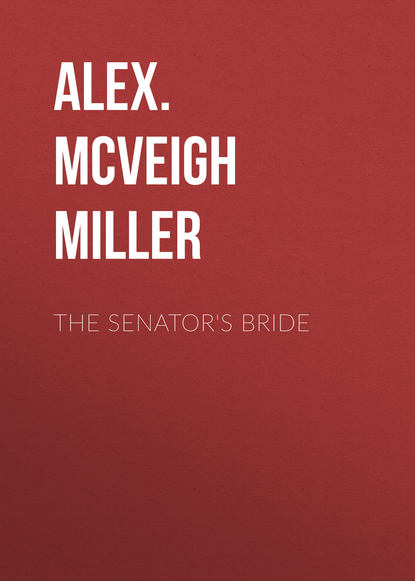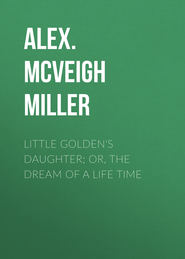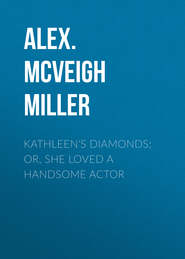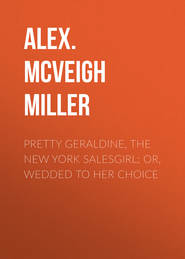По всем вопросам обращайтесь на: info@litportal.ru
(©) 2003-2024.
✖
The Senator's Bride
Настройки чтения
Размер шрифта
Высота строк
Поля
For a moment the silence of unspeakable emotion fell between them; she struggled for speech, waving her hand for him to pause, while over her pure, pale face a flood of indignant crimson warmly drifted.
"Rise, sir," she answered, at last, in low, proud tones, "such words are an insult to me!"
"And why? Oh! Grace, can you not forgive me, can you not love me? You loved me once, I know. Don't send me away. Promise that I may still love you, that you will be my worshiped wife!"
She did not laugh at him, as you or I might have done, my reader. It was not in the nature of the girl Bruce Conway had scorned for her low estate to be anything but sweet and merciful. She looked at him, still faintly flushed and excited, but answered with unconsciously straightening figure, and a firm but gentle dignity peculiar to her always:
"Possibly you are not aware, Mr. Conway, that your words of love are addressed to one who is already a wife—and mother."
Mr. Conway had never fainted in his life, but with a feeling that sense and strength were giving way, he rose, and, dropping into a chair, white as death, looked at the young creature whose quiet assertion of matronly dignity had fallen on his ears like a death-warrant. And as he looked, with that strange power we have of discriminating details even in the most eventful hours, he noticed many things that went far to prove the truth of her words. He had left her poor and almost friendless, her richest dress a simple white muslin, and scarcely another piece of jewelry than the simple trinket of gold and pearls that clasped the frill of lace at her white throat. To-night she wore a sweeping robe of costly white silk, with flouncings of real lace, that was worth a small fortune in itself. There were diamonds on the wavering swell of her white bosom, depending from the pearly ears, scintillating fire from her restless taper wrists, clasping her statuesque throat like sunshine glowing on snow. She was wealthy, prosperous, beloved now, he read in the restful peace that crowned her innocent brow; and bitterest thought of all to the man who had loved and deserted her—another man called her his wife—another man's child called her mother.
While she stood with that flush of offended wifely dignity burning hotly on her pure cheek, while he looked at her with a soul's despair written on his handsome features, a gentleman entered the room carrying an ice. He was tall and splendidly handsome, his countenance frank, and pleasant, but a slight frown contracted his brow as he took in the scene, and it did not clear away as the lady said, distantly:
"Mr. Conway, allow me the pleasure of presenting to you my husband, Senator Winans."
Both gentlemen bowed ceremoniously, but neither offered the hand. Mr. Conway hated Winans already, and the gentleman thus honored felt intuitively that he should hate Conway. So their greeting was of the briefest. The discomfited traveler turned and walked over to the Hon. Mrs. Winans.
"I beg your pardon," he said, in low, earnest tones; "I did not know—had not heard the least hint of your marriage."
He was gone the next moment. Senator Winans looked inquiringly at his beautiful young wife. She did not speak; he fancied she shrank a little as he looked at her, but as he set down the ice on a small flower-stand near by, she took up the little golden spoon and let a tiny bit of the frozen cream melt on her ruby lip, while a faint smile dimpled the corners of her mouth.
"My love," he said, lifting the small, white hand, and toying with its jeweled fingers, "are you ill? Your hand is cold as ice."
"I never felt better in my life," smiling up into his questioning eyes, and nestling the small hand still closer in his. "The cold cream chilled me after dancing so much, or," her natural truthfulness asserting itself, "I may be a little nervous, and that makes my hands cold."
"And what has made you nervous to-night?" his tone unconsciously stern and his thoughts full of the dark, despairing face that had looked up from the depths of the arm-chair at his queenly looking wife.
"Nothing," she answered, dreamily, while a swift flush burned on her cheek, and she turned away a little petulantly and began to trifle with the ice again.
"I beg your pardon, but it was something, and that something was the man who has just left us. Who and what is he?"
"Mr. Bruce Conway, nephew and heir of our hostess. He has been abroad four years, I think, and but just returned."
"An old acquaintance of yours, then?"
"Well, yes."
She turned toward him with marvelous sweetness and self-command.
"During my stay with Mrs. Conway I was naturally brought frequently in contact with her nephew. I found him a pleasant acquaintance."
"Nothing more—was he not a lover?"
His beautiful dark eyes seemed to burn into her soul, so full were they of jealous pain and sudden doubt.
She came up to him, crossing her round white arms over one of his, looking up at him with an arch, merry smile.
"I really cannot say, since he never confessed to a tender passion for me. The difference in our stations precluded anything of the sort. You must remember that there are few men like you, my loyal love, who stooped to lift a beggar-maid to share your throne."
Her eyes were misty and full of unshed tears, partly out of gratitude and love for him, and partly—she could not help it—because she was conscious of a sharp, agonized remembrance of a night four years before, the very thought of which made her turn white and cold as death as she leaned upon her husband's arm.
One hand beneath her dimpled chin lifted her face to meet his gaze. She met it sweetly and frankly, but he knew her well enough to know that the intense blackness of her dilated eyes denoted deep emotion.
"Tell me the truth, Gracie," he entreated. "That man looked at you as no mere acquaintance ever looked at a woman—looked at you as he had no right to look at the wife of another man! What mystery is this you are trying to withhold from me? If you refuse to answer what I have a right to know you force me to seek satisfaction from him."
He was terribly in earnest. The baleful fire of doubt and jealousy burned in his eagle gaze, and startled the young creature who read its language with a vague doubt creeping into her soul. She did not want to deceive her husband—still less did she want to tell him the truth for which he asked.
"Spare me!" she entreated. "There is nothing to tell, my love—nothing of any consequence, I mean. It would but annoy you to hear it, mortify me to tell it," and once more the warm blush of insulted matronly pride tinged the girlish cheek with crimson.
"For all that I insist upon having an explanation of the scene I witnessed here after leaving you scarcely a minute before!"
Unconsciously to himself he shook off the small hands that clasped his arm in his eager interest and excitement. She did not replace them, but, folding both her arms across her breast, lifted her pale, earnest face to his.
Her answer came low and sweet, though perhaps a trifle impatient, as though the subject seemed to her scarcely worth this "wordy war."
"Well, then, Mr. Bruce Conway startled me very much by entering here quite suddenly and making me an offer of his hand, declaring that he had learned to love me while abroad. I checked him by telling him that I was a wife and mother. You heard his apology to me—he did not know of my marriage. That is all there is to tell."
He looked at her and half smiled at thought of Conway's discomfiture; but the passing merriment was displaced in a moment by the sharp pain tugging at his heart-strings. He had the jealous Southern nature to perfection. He could not endure even the thought that another had ever enshrined in his heart the image of Grace, his lovely girl-bride. So sharp a pang tore his heart that he could not move nor speak.
"Paul, my husband"—she looked up at him as wondrously fair in his eyes as she had been in Bruce Conway's, and with a timid grace that was infinitely becoming to her—"surely you do not blame me. I could not help it. I am sorry it has happened. I cannot say more."
It was not in human nature to withstand the mute pleading of her manner, or the soft gaze that met his own. He stooped and touched his lips to her pure brow.
"Let us go, love," he said. "I confess that I shall feel better away from here and in our pleasant home."
"But this reception was given for us. Our hostess will feel offended at so early a departure."
"I will tell her we were called away—that is, unless you wish to remain."
"No, indeed; I would rather be at home with my precious baby; and your wishes are always mine, Paul."
How exquisitely she tempered wifely submission and obedience with gentleness and love! If there was a cross in her life, she wreathed it over with flowers. Her soothing voice fell like the oil of peace on the troubled waters of his soul.
Long after their adieus to their hostess had been spoken, and his arm had lovingly lifted her into her carriage, Bruce Conway's eyes watched vacantly the spot where she had vanished from his sight, while that haggard wanness of despair never left his face. Never until the hour in which he knew her irrevocably lost to him did he realize how deeply rooted in his soul his love had been. Amid all the glories of the old world he had felt that life was a desert without her, and in the Arabian deserts the knowledge had dawned slowly upon him, that even here her mere presence would have created a paradise of bliss. Far away from her, unconsciously to her, he had mentally renounced his anticipated inheritance, and come home with the fixed intention of winning her, and toiling, if need be, cheerfully for her.
Not a thought of disappointment, not a possibility of her marriage had crossed his mind. It was left to this hour, when he stood there listening to the slow crunch of her carriage wheels that seemed grinding over his heart as they rolled away, to know his own heart truly, and to feel how much better than he knew himself his friend had known him when he said, on almost the same spot where he now stood alone:
"Is it not just as possible that the day may come when for the sake of the loving, trusting, friendless child you desert to-day, you would peril not only your hopes of present fortune and future prosperity, but your aspirations for a brighter world?"
It had come. Passionate heart, undisciplined temper, unsatisfied yearnings clamored fiercely for the woman who had loved him as he would never be loved again. He would have given then, in his wild abandonment to his love and despair, all his hopes of fortune, his dreams of fame, his chances of futurity, to have stood for one hour in the place of the man who, even then in his beautiful home, clasped wife and child in one embrace to his noble heart, while he thanked God for the treasure of a pure woman's love.
A touch on his shoulder, a voice in his ear jarred suddenly on his wild, semi-savage mood.
"Be a man, Bruce, old fellow, be a man. It is too late for unavailing regrets. Call all your manhood to your aid."
"Clendenon, is it you?" He turned and wrung his friend's hand with a grip that must have pained him. "Have you come to exult over my misery with the stereotyped 'I told you so?'"
"Can you think it of me? Bruce, I have watched you for the last five minutes, and I understand your feelings. From my soul I pity you!"
"Rise, sir," she answered, at last, in low, proud tones, "such words are an insult to me!"
"And why? Oh! Grace, can you not forgive me, can you not love me? You loved me once, I know. Don't send me away. Promise that I may still love you, that you will be my worshiped wife!"
She did not laugh at him, as you or I might have done, my reader. It was not in the nature of the girl Bruce Conway had scorned for her low estate to be anything but sweet and merciful. She looked at him, still faintly flushed and excited, but answered with unconsciously straightening figure, and a firm but gentle dignity peculiar to her always:
"Possibly you are not aware, Mr. Conway, that your words of love are addressed to one who is already a wife—and mother."
Mr. Conway had never fainted in his life, but with a feeling that sense and strength were giving way, he rose, and, dropping into a chair, white as death, looked at the young creature whose quiet assertion of matronly dignity had fallen on his ears like a death-warrant. And as he looked, with that strange power we have of discriminating details even in the most eventful hours, he noticed many things that went far to prove the truth of her words. He had left her poor and almost friendless, her richest dress a simple white muslin, and scarcely another piece of jewelry than the simple trinket of gold and pearls that clasped the frill of lace at her white throat. To-night she wore a sweeping robe of costly white silk, with flouncings of real lace, that was worth a small fortune in itself. There were diamonds on the wavering swell of her white bosom, depending from the pearly ears, scintillating fire from her restless taper wrists, clasping her statuesque throat like sunshine glowing on snow. She was wealthy, prosperous, beloved now, he read in the restful peace that crowned her innocent brow; and bitterest thought of all to the man who had loved and deserted her—another man called her his wife—another man's child called her mother.
While she stood with that flush of offended wifely dignity burning hotly on her pure cheek, while he looked at her with a soul's despair written on his handsome features, a gentleman entered the room carrying an ice. He was tall and splendidly handsome, his countenance frank, and pleasant, but a slight frown contracted his brow as he took in the scene, and it did not clear away as the lady said, distantly:
"Mr. Conway, allow me the pleasure of presenting to you my husband, Senator Winans."
Both gentlemen bowed ceremoniously, but neither offered the hand. Mr. Conway hated Winans already, and the gentleman thus honored felt intuitively that he should hate Conway. So their greeting was of the briefest. The discomfited traveler turned and walked over to the Hon. Mrs. Winans.
"I beg your pardon," he said, in low, earnest tones; "I did not know—had not heard the least hint of your marriage."
He was gone the next moment. Senator Winans looked inquiringly at his beautiful young wife. She did not speak; he fancied she shrank a little as he looked at her, but as he set down the ice on a small flower-stand near by, she took up the little golden spoon and let a tiny bit of the frozen cream melt on her ruby lip, while a faint smile dimpled the corners of her mouth.
"My love," he said, lifting the small, white hand, and toying with its jeweled fingers, "are you ill? Your hand is cold as ice."
"I never felt better in my life," smiling up into his questioning eyes, and nestling the small hand still closer in his. "The cold cream chilled me after dancing so much, or," her natural truthfulness asserting itself, "I may be a little nervous, and that makes my hands cold."
"And what has made you nervous to-night?" his tone unconsciously stern and his thoughts full of the dark, despairing face that had looked up from the depths of the arm-chair at his queenly looking wife.
"Nothing," she answered, dreamily, while a swift flush burned on her cheek, and she turned away a little petulantly and began to trifle with the ice again.
"I beg your pardon, but it was something, and that something was the man who has just left us. Who and what is he?"
"Mr. Bruce Conway, nephew and heir of our hostess. He has been abroad four years, I think, and but just returned."
"An old acquaintance of yours, then?"
"Well, yes."
She turned toward him with marvelous sweetness and self-command.
"During my stay with Mrs. Conway I was naturally brought frequently in contact with her nephew. I found him a pleasant acquaintance."
"Nothing more—was he not a lover?"
His beautiful dark eyes seemed to burn into her soul, so full were they of jealous pain and sudden doubt.
She came up to him, crossing her round white arms over one of his, looking up at him with an arch, merry smile.
"I really cannot say, since he never confessed to a tender passion for me. The difference in our stations precluded anything of the sort. You must remember that there are few men like you, my loyal love, who stooped to lift a beggar-maid to share your throne."
Her eyes were misty and full of unshed tears, partly out of gratitude and love for him, and partly—she could not help it—because she was conscious of a sharp, agonized remembrance of a night four years before, the very thought of which made her turn white and cold as death as she leaned upon her husband's arm.
One hand beneath her dimpled chin lifted her face to meet his gaze. She met it sweetly and frankly, but he knew her well enough to know that the intense blackness of her dilated eyes denoted deep emotion.
"Tell me the truth, Gracie," he entreated. "That man looked at you as no mere acquaintance ever looked at a woman—looked at you as he had no right to look at the wife of another man! What mystery is this you are trying to withhold from me? If you refuse to answer what I have a right to know you force me to seek satisfaction from him."
He was terribly in earnest. The baleful fire of doubt and jealousy burned in his eagle gaze, and startled the young creature who read its language with a vague doubt creeping into her soul. She did not want to deceive her husband—still less did she want to tell him the truth for which he asked.
"Spare me!" she entreated. "There is nothing to tell, my love—nothing of any consequence, I mean. It would but annoy you to hear it, mortify me to tell it," and once more the warm blush of insulted matronly pride tinged the girlish cheek with crimson.
"For all that I insist upon having an explanation of the scene I witnessed here after leaving you scarcely a minute before!"
Unconsciously to himself he shook off the small hands that clasped his arm in his eager interest and excitement. She did not replace them, but, folding both her arms across her breast, lifted her pale, earnest face to his.
Her answer came low and sweet, though perhaps a trifle impatient, as though the subject seemed to her scarcely worth this "wordy war."
"Well, then, Mr. Bruce Conway startled me very much by entering here quite suddenly and making me an offer of his hand, declaring that he had learned to love me while abroad. I checked him by telling him that I was a wife and mother. You heard his apology to me—he did not know of my marriage. That is all there is to tell."
He looked at her and half smiled at thought of Conway's discomfiture; but the passing merriment was displaced in a moment by the sharp pain tugging at his heart-strings. He had the jealous Southern nature to perfection. He could not endure even the thought that another had ever enshrined in his heart the image of Grace, his lovely girl-bride. So sharp a pang tore his heart that he could not move nor speak.
"Paul, my husband"—she looked up at him as wondrously fair in his eyes as she had been in Bruce Conway's, and with a timid grace that was infinitely becoming to her—"surely you do not blame me. I could not help it. I am sorry it has happened. I cannot say more."
It was not in human nature to withstand the mute pleading of her manner, or the soft gaze that met his own. He stooped and touched his lips to her pure brow.
"Let us go, love," he said. "I confess that I shall feel better away from here and in our pleasant home."
"But this reception was given for us. Our hostess will feel offended at so early a departure."
"I will tell her we were called away—that is, unless you wish to remain."
"No, indeed; I would rather be at home with my precious baby; and your wishes are always mine, Paul."
How exquisitely she tempered wifely submission and obedience with gentleness and love! If there was a cross in her life, she wreathed it over with flowers. Her soothing voice fell like the oil of peace on the troubled waters of his soul.
Long after their adieus to their hostess had been spoken, and his arm had lovingly lifted her into her carriage, Bruce Conway's eyes watched vacantly the spot where she had vanished from his sight, while that haggard wanness of despair never left his face. Never until the hour in which he knew her irrevocably lost to him did he realize how deeply rooted in his soul his love had been. Amid all the glories of the old world he had felt that life was a desert without her, and in the Arabian deserts the knowledge had dawned slowly upon him, that even here her mere presence would have created a paradise of bliss. Far away from her, unconsciously to her, he had mentally renounced his anticipated inheritance, and come home with the fixed intention of winning her, and toiling, if need be, cheerfully for her.
Not a thought of disappointment, not a possibility of her marriage had crossed his mind. It was left to this hour, when he stood there listening to the slow crunch of her carriage wheels that seemed grinding over his heart as they rolled away, to know his own heart truly, and to feel how much better than he knew himself his friend had known him when he said, on almost the same spot where he now stood alone:
"Is it not just as possible that the day may come when for the sake of the loving, trusting, friendless child you desert to-day, you would peril not only your hopes of present fortune and future prosperity, but your aspirations for a brighter world?"
It had come. Passionate heart, undisciplined temper, unsatisfied yearnings clamored fiercely for the woman who had loved him as he would never be loved again. He would have given then, in his wild abandonment to his love and despair, all his hopes of fortune, his dreams of fame, his chances of futurity, to have stood for one hour in the place of the man who, even then in his beautiful home, clasped wife and child in one embrace to his noble heart, while he thanked God for the treasure of a pure woman's love.
A touch on his shoulder, a voice in his ear jarred suddenly on his wild, semi-savage mood.
"Be a man, Bruce, old fellow, be a man. It is too late for unavailing regrets. Call all your manhood to your aid."
"Clendenon, is it you?" He turned and wrung his friend's hand with a grip that must have pained him. "Have you come to exult over my misery with the stereotyped 'I told you so?'"
"Can you think it of me? Bruce, I have watched you for the last five minutes, and I understand your feelings. From my soul I pity you!"











